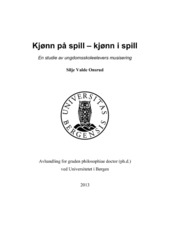| dc.description.abstract | This doctoral thesis is an investigation of gender constructions in Norwegian secondary school music education. With the high influence of popular music and band instrumentation in the classroom, the study questions how students imitate gender figures from popular music and how they use music to perform gender and to negotiate between different gender discourses in music cultures, in school and in the society surrounding them. The research question is twofold. Firstly: How is gender constructed in students’ ‘musicking’ in Norwegian secondary school, in how they articulate their ‘musicking’ and how the music teacher facilitates ‘musicking’? Secondly: What implications can such gender constructions have for the production of knowledge in the discipline of music? The neologism ‘musicking’ is borrowed from the musicologist Christopher Small. The concept includes both musical performance, listening to music, arranging a concert, selling tickets, and so on. In other words Small operates with a very broad cultural understanding of musical activities. Though the concept of ‘musicking’ is central in the dissertation, this is not a musicological study, but rather a music pedagogical study that views music education as a discursive practise. This theoretical approach is especially inspired by the latest texts by Michel Foucault on discourse, power and knowledge. The Foucauldian understanding of the social world as discursive practices and orders is grounded in a social constructionist science theoretical paradigm. By using the concept gender constructions, this theoretical approach to gender and musical practice is indicated. It has therefore been important to collect statements from the field of music education in Norwegian secondary school and to identify constructions of gender in relation to music. To Foucault, statements are both practical and verbal. The data generated from an ethnographic inspired perspective therefore consists of both classroom observations of music activities and interviews with students and their music teacher. The fieldwork took place in two urban lower secondary schools in one of the larger cities of Norway in four different music teaching practices. Beside the observations and interviews teaching material that has been used in the field observed, such as textbooks, internet pages, song repertoire and curriculums (national and local) provide supplementary data. The main finding of the study is that band instrumentation has a huge impact on the music educational practices I have been visiting. The hegemonic status of band playing is connected to gender. Both verbally and practically band playing and rock music are constructed as masculine activities. Even though the band instruments are very popular both among boys and girls, it is mainly boys that play in the band when they are given the opportunity to choose. Girls more frequently choose to sing, dance or play pop ballades on the acoustic guitar or the piano, even though they find the elguitar or the drums “cool” and fun to play. Such paradoxes between speech and action indicate that students in secondary school are negotiating between different gender discourses. On one hand they are growing up with politics of gender emphasising equality between boys and girls. Oppositional gender-stereotypes from popular culture have a huge impact on the teenagers. This conflict can be recognized in the students’ action and speech. A second finding is that gender is at stake when hip-hop music is brought into the classroom. It seems to be a clear view among students in the study that you have to be male to do rapping in an authentic way. Still, my observations show that girls are the most active rappers when hip-hop music is used in two of the practices I visited. Girls also show a huge interest and competence in hip-hop dancing, not as break-dance, but as a sort of choreographed line dance. The dominant interest of band playing among the boys in the study is also prevalent when hip-hop is the genre. To hide behind an instrument seems to be a comfortable place for boys to be. How students perform hiphop in the classroom show how they negotiate between the gender discourses in hip-hop and other gender discourses that strongly govern their action. The teacher’s conditioning position in the negotiation is also analyzed. To understand why gender is constructed the ways found in the data, I draw on Judith Butler’s theory about gender performativity. According to Butler we imitate already existing gender figures in our culture to make sense of ourselves and others. In the data pupils mostly take their imitations from artists performing stereotyped gender figures in rock, pop and hip hop. In my analysis I relate this to the power relations governing the students’ gender performativity. The aim of the study has been to highlight the taken-for-granted gender relations in music education, and to see how they influence learning and formation processes. In the last chapter I therefore discuss the findings in relation to the knowledge production in the music subject. What is made possible and what is excluded from the subject? Informal learning strategies from popular music have become important in music education. I question the gendered effects of such learning strategies and also the teachers’ role in informal learning. The findings also contribute to the discussion of a “feminized school”. The study shows that the music subject offers certain masculinities from rock and hip-hop that appeal to boys. In that sense the music subject stands counter to the so called “feminized school”. I also discuss potential knowledge production of the findings in relation to aesthetic formation, and ask if music education in secondary school contributes to a stereotype gendered aesthetic formation instead of opening up for a larger variety of gender performativity. | en_US |
